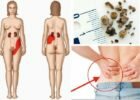Do you constantly have a feeling of tiredness and weakness that is accompanied by swelling of the hands and ankles? If you do, then you may be suffering from potassium deficiency.
What is Potassium Deficiency?
Potassium is a mineral found in foods. Also, it’s an electrolyte, which conducts electrical impulses throughout the body.
Potassium helps our muscles contract, helps regulate fluids and mineral balance in our body cells and helps maintain normal blood pressure. For elderly people potassium reduces the risk of possibly bone loss. It also improves our liver, kidney, and heart functions.
Symptoms of Potassium Deficiency
Symptoms of low potassium can often go unnoticed as sometimes they are too mild to be very noticeable and other times they can be confused with symptoms of a separate condition.
Potassium deficiency most often has an effect on the gastrointestinal tract, kidneys, muscles, heart and nerves as it is required for the proper function of these bodily systems.
The most common symptoms are:
-Weakness, tiredness or cramping in arm or leg muscles.
-Tingling or numbness
-Stomach cramps and bloating
-Constipation
-Nausea or vomiting
-Irregular heart beat
-Fainting, usually caused by low blood pressure
-Confusion or hallucinations
-Swelling of the face, feet, ankles, and abdomen
Although many of these symptoms can be due to factors other than potassium deficiency, if you are having severe muscle cramps, are feeling faint or are experiencing an irregular heartbeat it is advised that you seek medical attention immediately.
Causes of Potassium Deficiency
The major causes of potassium deficiency are excessive sweating, diarrhea, and general dehydration. Also, not eating enough foods rich in potassium can lead to its deficiency.
The best way to make sure that you are always potassium efficient is to consume a diet that is rich in potassium. Thankfully, it just so happens that the foods highest in potassium are also great for your overall health.
Here are some of the foods that are highest in potassium:
-Banana (420 mg of potassium)
-Potato (500 mg of potassium)
-Chard (510 mg of potassium)
-Spinach (350 mg of potassium)
-Broccoli (350 mg of potassium)
-Nuts (400 mg of potassium)
-Kidney beans (600mg of potassium)
You must know that daily intake of potassium for an adult is a bit less than 5000 mg. It isn’t very hard to get enough potassium, as long as you include a variety of fruits, vegetables, and lean protein in your diet.
Source:




